NZDB 510: Exploring the Business Environment of New Zealand
VerifiedAdded on 2023/06/11
|18
|4310
|435
Report
AI Summary
This report examines the implications of the Treaty of Waitangi on business transactions in New Zealand, emphasizing the role of stakeholders and the key features of Maori business practices. It identifies the relevance, features, and objectives of Ngai Tahu Holdings, highlighting the four basic principles of the organization. The report also explores the impact of the external environment on strategic planning for businesses in New Zealand, analyzing how factors like biculturalism and stakeholder partnerships influence business development and growth. The analysis incorporates both qualitative and quantitative perspectives to assess the impact of these factors on business operations.

Running Head: BUSINESS ENVIRONMENT OF NEW ZEALAND
BUSINESS ENVIRONMENT OF NEW ZEALAND
Name of the Student:
Name of the University:
Author Note
BUSINESS ENVIRONMENT OF NEW ZEALAND
Name of the Student:
Name of the University:
Author Note
Paraphrase This Document
Need a fresh take? Get an instant paraphrase of this document with our AI Paraphraser
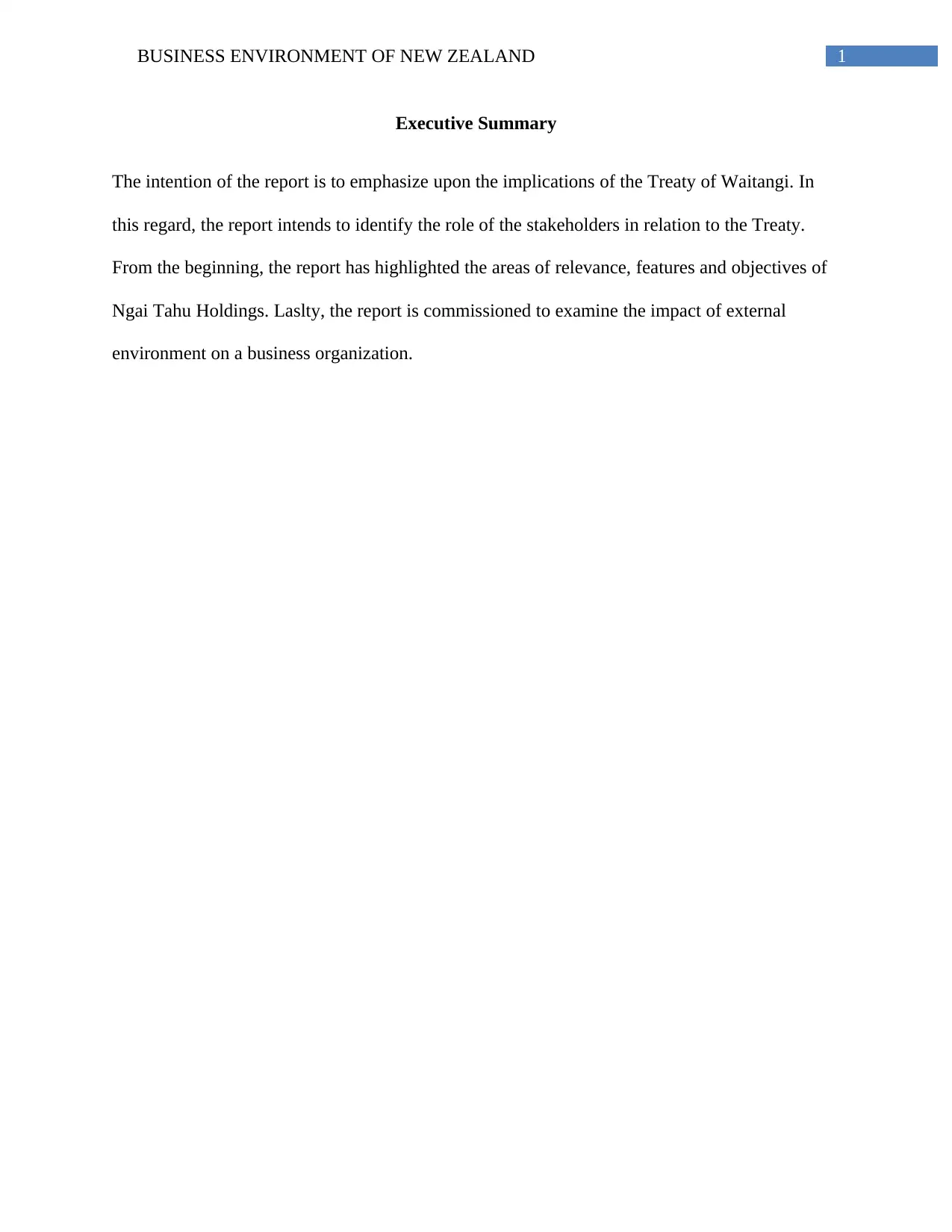
1BUSINESS ENVIRONMENT OF NEW ZEALAND
Executive Summary
The intention of the report is to emphasize upon the implications of the Treaty of Waitangi. In
this regard, the report intends to identify the role of the stakeholders in relation to the Treaty.
From the beginning, the report has highlighted the areas of relevance, features and objectives of
Ngai Tahu Holdings. Laslty, the report is commissioned to examine the impact of external
environment on a business organization.
Executive Summary
The intention of the report is to emphasize upon the implications of the Treaty of Waitangi. In
this regard, the report intends to identify the role of the stakeholders in relation to the Treaty.
From the beginning, the report has highlighted the areas of relevance, features and objectives of
Ngai Tahu Holdings. Laslty, the report is commissioned to examine the impact of external
environment on a business organization.
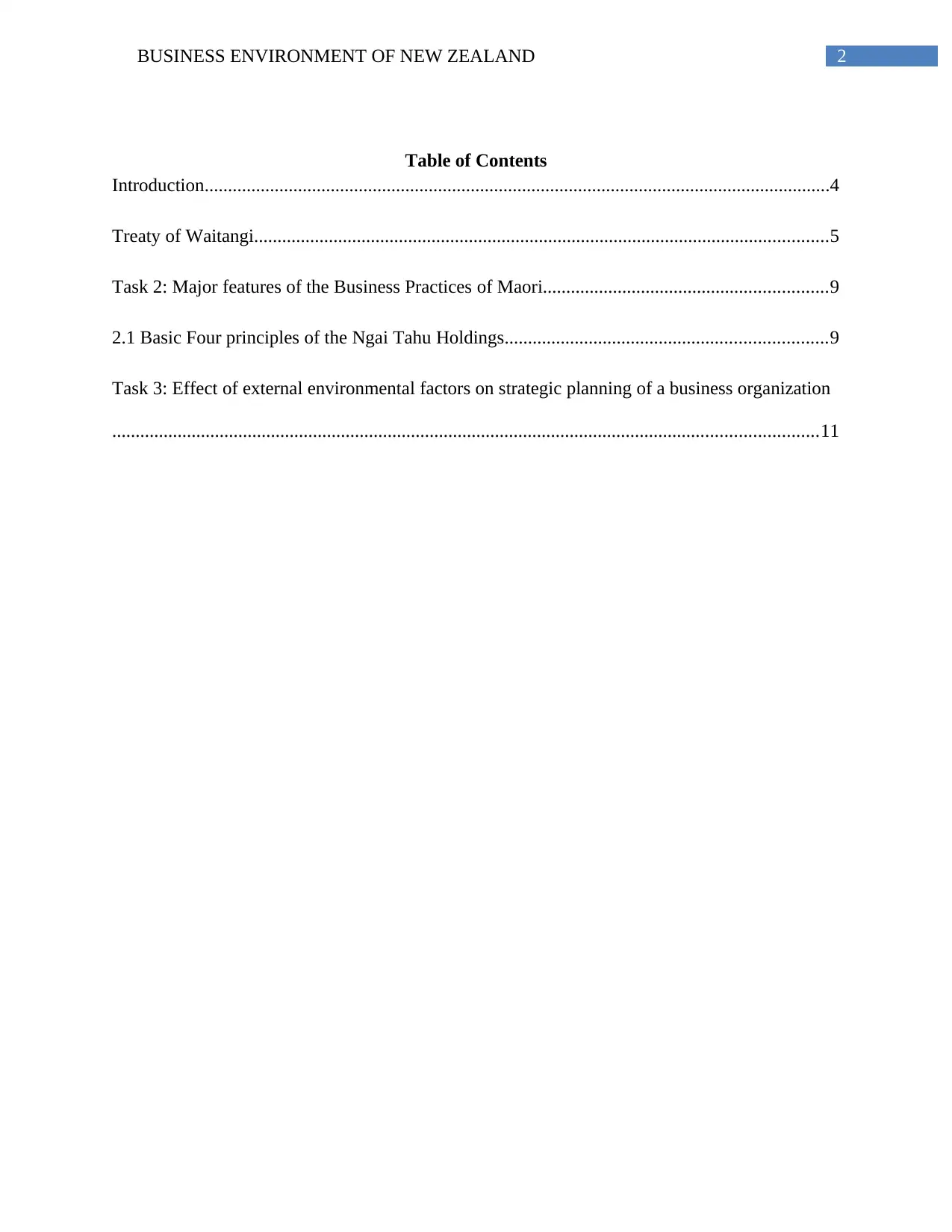
2BUSINESS ENVIRONMENT OF NEW ZEALAND
Table of Contents
Introduction......................................................................................................................................4
Treaty of Waitangi...........................................................................................................................5
Task 2: Major features of the Business Practices of Maori.............................................................9
2.1 Basic Four principles of the Ngai Tahu Holdings.....................................................................9
Task 3: Effect of external environmental factors on strategic planning of a business organization
.......................................................................................................................................................11
Table of Contents
Introduction......................................................................................................................................4
Treaty of Waitangi...........................................................................................................................5
Task 2: Major features of the Business Practices of Maori.............................................................9
2.1 Basic Four principles of the Ngai Tahu Holdings.....................................................................9
Task 3: Effect of external environmental factors on strategic planning of a business organization
.......................................................................................................................................................11
⊘ This is a preview!⊘
Do you want full access?
Subscribe today to unlock all pages.

Trusted by 1+ million students worldwide
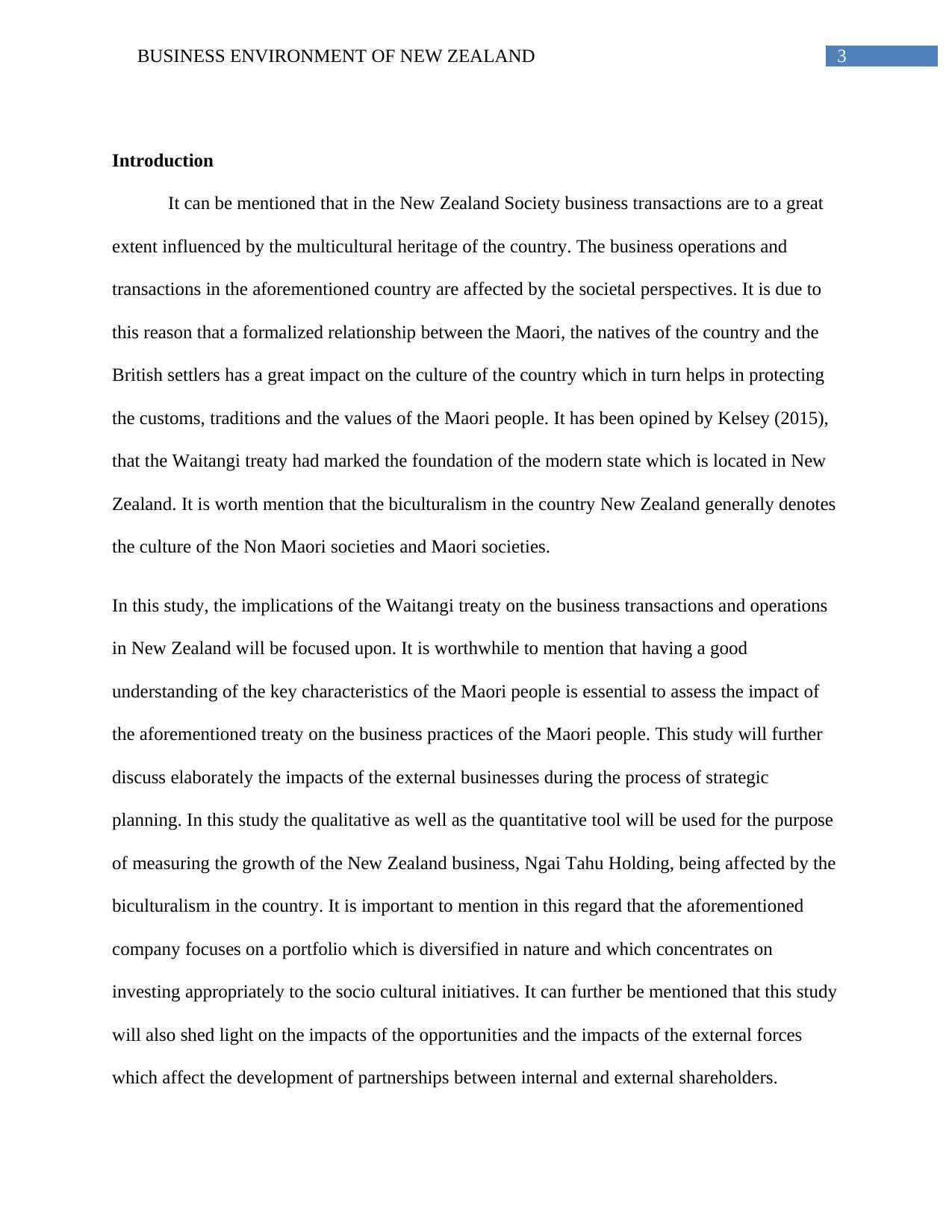
3BUSINESS ENVIRONMENT OF NEW ZEALAND
Introduction
It can be mentioned that in the New Zealand Society business transactions are to a great
extent influenced by the multicultural heritage of the country. The business operations and
transactions in the aforementioned country are affected by the societal perspectives. It is due to
this reason that a formalized relationship between the Maori, the natives of the country and the
British settlers has a great impact on the culture of the country which in turn helps in protecting
the customs, traditions and the values of the Maori people. It has been opined by Kelsey (2015),
that the Waitangi treaty had marked the foundation of the modern state which is located in New
Zealand. It is worth mention that the biculturalism in the country New Zealand generally denotes
the culture of the Non Maori societies and Maori societies.
In this study, the implications of the Waitangi treaty on the business transactions and operations
in New Zealand will be focused upon. It is worthwhile to mention that having a good
understanding of the key characteristics of the Maori people is essential to assess the impact of
the aforementioned treaty on the business practices of the Maori people. This study will further
discuss elaborately the impacts of the external businesses during the process of strategic
planning. In this study the qualitative as well as the quantitative tool will be used for the purpose
of measuring the growth of the New Zealand business, Ngai Tahu Holding, being affected by the
biculturalism in the country. It is important to mention in this regard that the aforementioned
company focuses on a portfolio which is diversified in nature and which concentrates on
investing appropriately to the socio cultural initiatives. It can further be mentioned that this study
will also shed light on the impacts of the opportunities and the impacts of the external forces
which affect the development of partnerships between internal and external shareholders.
Introduction
It can be mentioned that in the New Zealand Society business transactions are to a great
extent influenced by the multicultural heritage of the country. The business operations and
transactions in the aforementioned country are affected by the societal perspectives. It is due to
this reason that a formalized relationship between the Maori, the natives of the country and the
British settlers has a great impact on the culture of the country which in turn helps in protecting
the customs, traditions and the values of the Maori people. It has been opined by Kelsey (2015),
that the Waitangi treaty had marked the foundation of the modern state which is located in New
Zealand. It is worth mention that the biculturalism in the country New Zealand generally denotes
the culture of the Non Maori societies and Maori societies.
In this study, the implications of the Waitangi treaty on the business transactions and operations
in New Zealand will be focused upon. It is worthwhile to mention that having a good
understanding of the key characteristics of the Maori people is essential to assess the impact of
the aforementioned treaty on the business practices of the Maori people. This study will further
discuss elaborately the impacts of the external businesses during the process of strategic
planning. In this study the qualitative as well as the quantitative tool will be used for the purpose
of measuring the growth of the New Zealand business, Ngai Tahu Holding, being affected by the
biculturalism in the country. It is important to mention in this regard that the aforementioned
company focuses on a portfolio which is diversified in nature and which concentrates on
investing appropriately to the socio cultural initiatives. It can further be mentioned that this study
will also shed light on the impacts of the opportunities and the impacts of the external forces
which affect the development of partnerships between internal and external shareholders.
Paraphrase This Document
Need a fresh take? Get an instant paraphrase of this document with our AI Paraphraser
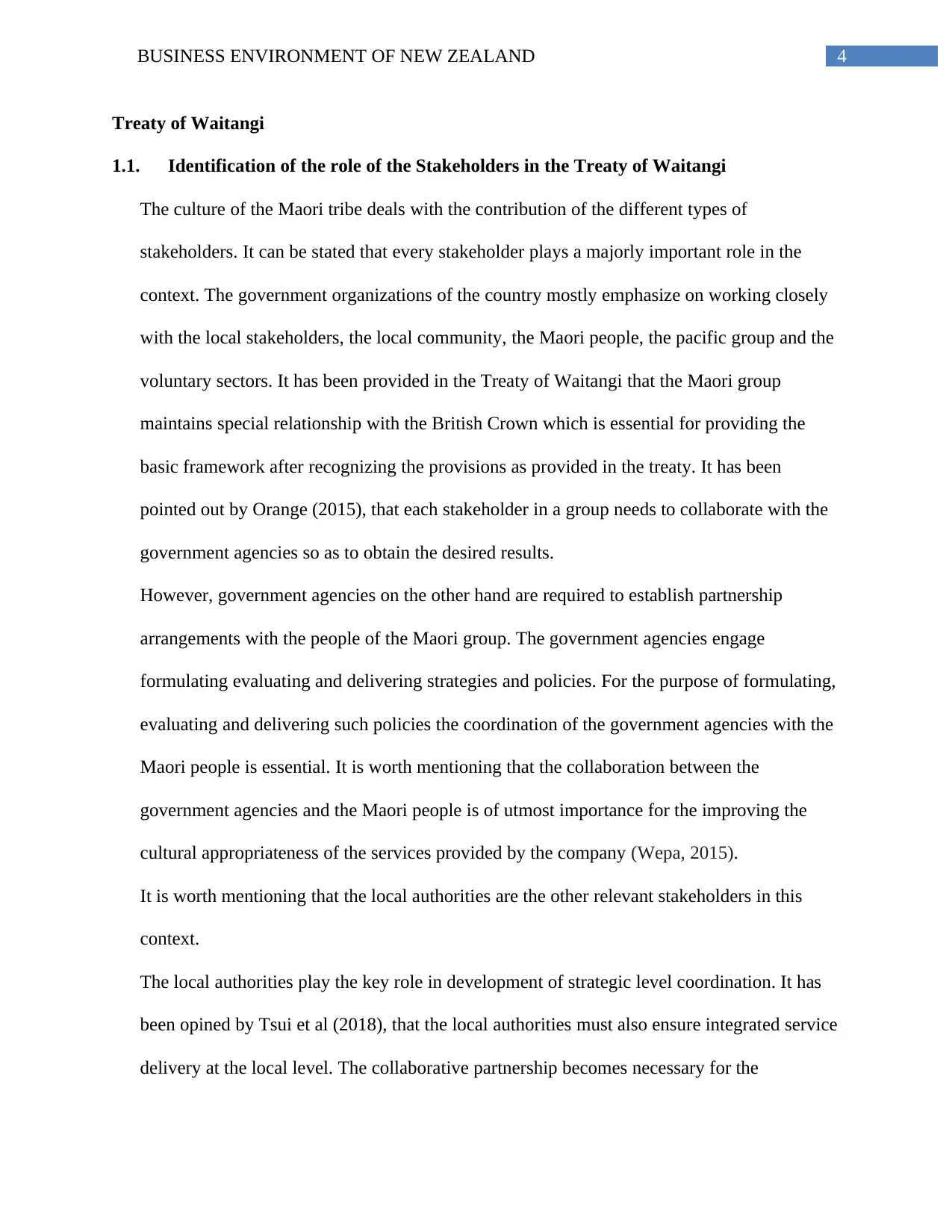
4BUSINESS ENVIRONMENT OF NEW ZEALAND
Treaty of Waitangi
1.1. Identification of the role of the Stakeholders in the Treaty of Waitangi
The culture of the Maori tribe deals with the contribution of the different types of
stakeholders. It can be stated that every stakeholder plays a majorly important role in the
context. The government organizations of the country mostly emphasize on working closely
with the local stakeholders, the local community, the Maori people, the pacific group and the
voluntary sectors. It has been provided in the Treaty of Waitangi that the Maori group
maintains special relationship with the British Crown which is essential for providing the
basic framework after recognizing the provisions as provided in the treaty. It has been
pointed out by Orange (2015), that each stakeholder in a group needs to collaborate with the
government agencies so as to obtain the desired results.
However, government agencies on the other hand are required to establish partnership
arrangements with the people of the Maori group. The government agencies engage
formulating evaluating and delivering strategies and policies. For the purpose of formulating,
evaluating and delivering such policies the coordination of the government agencies with the
Maori people is essential. It is worth mentioning that the collaboration between the
government agencies and the Maori people is of utmost importance for the improving the
cultural appropriateness of the services provided by the company (Wepa, 2015).
It is worth mentioning that the local authorities are the other relevant stakeholders in this
context.
The local authorities play the key role in development of strategic level coordination. It has
been opined by Tsui et al (2018), that the local authorities must also ensure integrated service
delivery at the local level. The collaborative partnership becomes necessary for the
Treaty of Waitangi
1.1. Identification of the role of the Stakeholders in the Treaty of Waitangi
The culture of the Maori tribe deals with the contribution of the different types of
stakeholders. It can be stated that every stakeholder plays a majorly important role in the
context. The government organizations of the country mostly emphasize on working closely
with the local stakeholders, the local community, the Maori people, the pacific group and the
voluntary sectors. It has been provided in the Treaty of Waitangi that the Maori group
maintains special relationship with the British Crown which is essential for providing the
basic framework after recognizing the provisions as provided in the treaty. It has been
pointed out by Orange (2015), that each stakeholder in a group needs to collaborate with the
government agencies so as to obtain the desired results.
However, government agencies on the other hand are required to establish partnership
arrangements with the people of the Maori group. The government agencies engage
formulating evaluating and delivering strategies and policies. For the purpose of formulating,
evaluating and delivering such policies the coordination of the government agencies with the
Maori people is essential. It is worth mentioning that the collaboration between the
government agencies and the Maori people is of utmost importance for the improving the
cultural appropriateness of the services provided by the company (Wepa, 2015).
It is worth mentioning that the local authorities are the other relevant stakeholders in this
context.
The local authorities play the key role in development of strategic level coordination. It has
been opined by Tsui et al (2018), that the local authorities must also ensure integrated service
delivery at the local level. The collaborative partnership becomes necessary for the
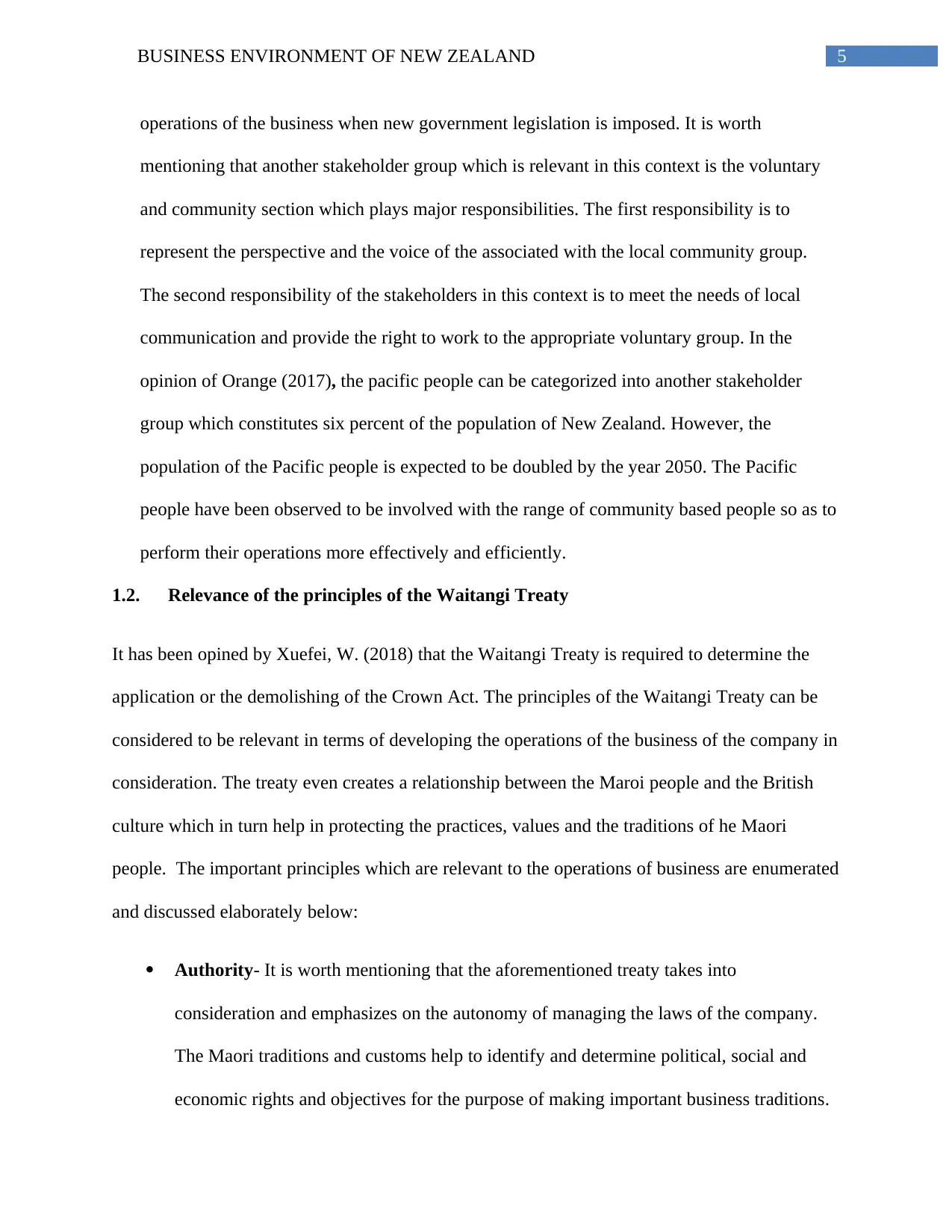
5BUSINESS ENVIRONMENT OF NEW ZEALAND
operations of the business when new government legislation is imposed. It is worth
mentioning that another stakeholder group which is relevant in this context is the voluntary
and community section which plays major responsibilities. The first responsibility is to
represent the perspective and the voice of the associated with the local community group.
The second responsibility of the stakeholders in this context is to meet the needs of local
communication and provide the right to work to the appropriate voluntary group. In the
opinion of Orange (2017), the pacific people can be categorized into another stakeholder
group which constitutes six percent of the population of New Zealand. However, the
population of the Pacific people is expected to be doubled by the year 2050. The Pacific
people have been observed to be involved with the range of community based people so as to
perform their operations more effectively and efficiently.
1.2. Relevance of the principles of the Waitangi Treaty
It has been opined by Xuefei, W. (2018) that the Waitangi Treaty is required to determine the
application or the demolishing of the Crown Act. The principles of the Waitangi Treaty can be
considered to be relevant in terms of developing the operations of the business of the company in
consideration. The treaty even creates a relationship between the Maroi people and the British
culture which in turn help in protecting the practices, values and the traditions of he Maori
people. The important principles which are relevant to the operations of business are enumerated
and discussed elaborately below:
Authority- It is worth mentioning that the aforementioned treaty takes into
consideration and emphasizes on the autonomy of managing the laws of the company.
The Maori traditions and customs help to identify and determine political, social and
economic rights and objectives for the purpose of making important business traditions.
operations of the business when new government legislation is imposed. It is worth
mentioning that another stakeholder group which is relevant in this context is the voluntary
and community section which plays major responsibilities. The first responsibility is to
represent the perspective and the voice of the associated with the local community group.
The second responsibility of the stakeholders in this context is to meet the needs of local
communication and provide the right to work to the appropriate voluntary group. In the
opinion of Orange (2017), the pacific people can be categorized into another stakeholder
group which constitutes six percent of the population of New Zealand. However, the
population of the Pacific people is expected to be doubled by the year 2050. The Pacific
people have been observed to be involved with the range of community based people so as to
perform their operations more effectively and efficiently.
1.2. Relevance of the principles of the Waitangi Treaty
It has been opined by Xuefei, W. (2018) that the Waitangi Treaty is required to determine the
application or the demolishing of the Crown Act. The principles of the Waitangi Treaty can be
considered to be relevant in terms of developing the operations of the business of the company in
consideration. The treaty even creates a relationship between the Maroi people and the British
culture which in turn help in protecting the practices, values and the traditions of he Maori
people. The important principles which are relevant to the operations of business are enumerated
and discussed elaborately below:
Authority- It is worth mentioning that the aforementioned treaty takes into
consideration and emphasizes on the autonomy of managing the laws of the company.
The Maori traditions and customs help to identify and determine political, social and
economic rights and objectives for the purpose of making important business traditions.
⊘ This is a preview!⊘
Do you want full access?
Subscribe today to unlock all pages.

Trusted by 1+ million students worldwide
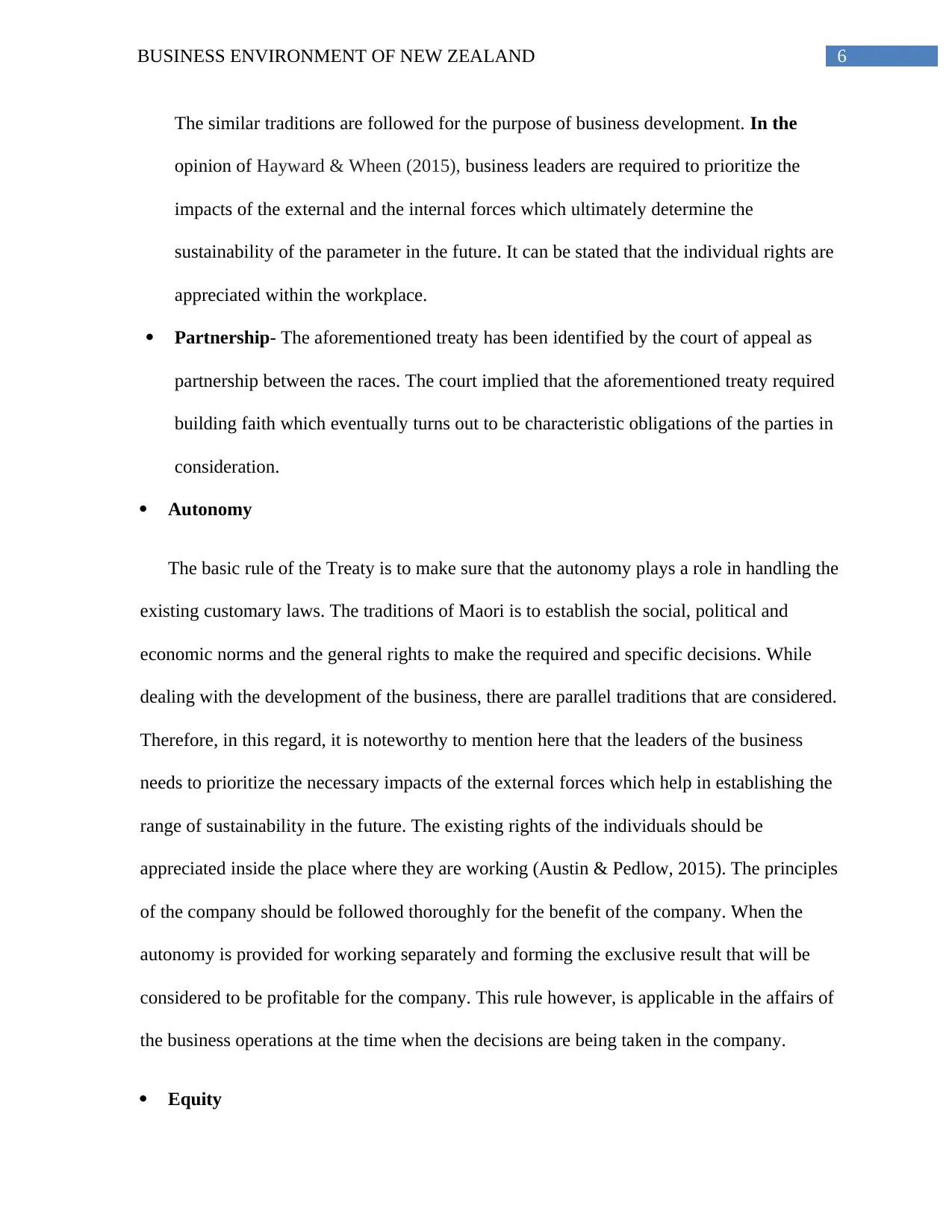
6BUSINESS ENVIRONMENT OF NEW ZEALAND
The similar traditions are followed for the purpose of business development. In the
opinion of Hayward & Wheen (2015), business leaders are required to prioritize the
impacts of the external and the internal forces which ultimately determine the
sustainability of the parameter in the future. It can be stated that the individual rights are
appreciated within the workplace.
Partnership- The aforementioned treaty has been identified by the court of appeal as
partnership between the races. The court implied that the aforementioned treaty required
building faith which eventually turns out to be characteristic obligations of the parties in
consideration.
Autonomy
The basic rule of the Treaty is to make sure that the autonomy plays a role in handling the
existing customary laws. The traditions of Maori is to establish the social, political and
economic norms and the general rights to make the required and specific decisions. While
dealing with the development of the business, there are parallel traditions that are considered.
Therefore, in this regard, it is noteworthy to mention here that the leaders of the business
needs to prioritize the necessary impacts of the external forces which help in establishing the
range of sustainability in the future. The existing rights of the individuals should be
appreciated inside the place where they are working (Austin & Pedlow, 2015). The principles
of the company should be followed thoroughly for the benefit of the company. When the
autonomy is provided for working separately and forming the exclusive result that will be
considered to be profitable for the company. This rule however, is applicable in the affairs of
the business operations at the time when the decisions are being taken in the company.
Equity
The similar traditions are followed for the purpose of business development. In the
opinion of Hayward & Wheen (2015), business leaders are required to prioritize the
impacts of the external and the internal forces which ultimately determine the
sustainability of the parameter in the future. It can be stated that the individual rights are
appreciated within the workplace.
Partnership- The aforementioned treaty has been identified by the court of appeal as
partnership between the races. The court implied that the aforementioned treaty required
building faith which eventually turns out to be characteristic obligations of the parties in
consideration.
Autonomy
The basic rule of the Treaty is to make sure that the autonomy plays a role in handling the
existing customary laws. The traditions of Maori is to establish the social, political and
economic norms and the general rights to make the required and specific decisions. While
dealing with the development of the business, there are parallel traditions that are considered.
Therefore, in this regard, it is noteworthy to mention here that the leaders of the business
needs to prioritize the necessary impacts of the external forces which help in establishing the
range of sustainability in the future. The existing rights of the individuals should be
appreciated inside the place where they are working (Austin & Pedlow, 2015). The principles
of the company should be followed thoroughly for the benefit of the company. When the
autonomy is provided for working separately and forming the exclusive result that will be
considered to be profitable for the company. This rule however, is applicable in the affairs of
the business operations at the time when the decisions are being taken in the company.
Equity
Paraphrase This Document
Need a fresh take? Get an instant paraphrase of this document with our AI Paraphraser
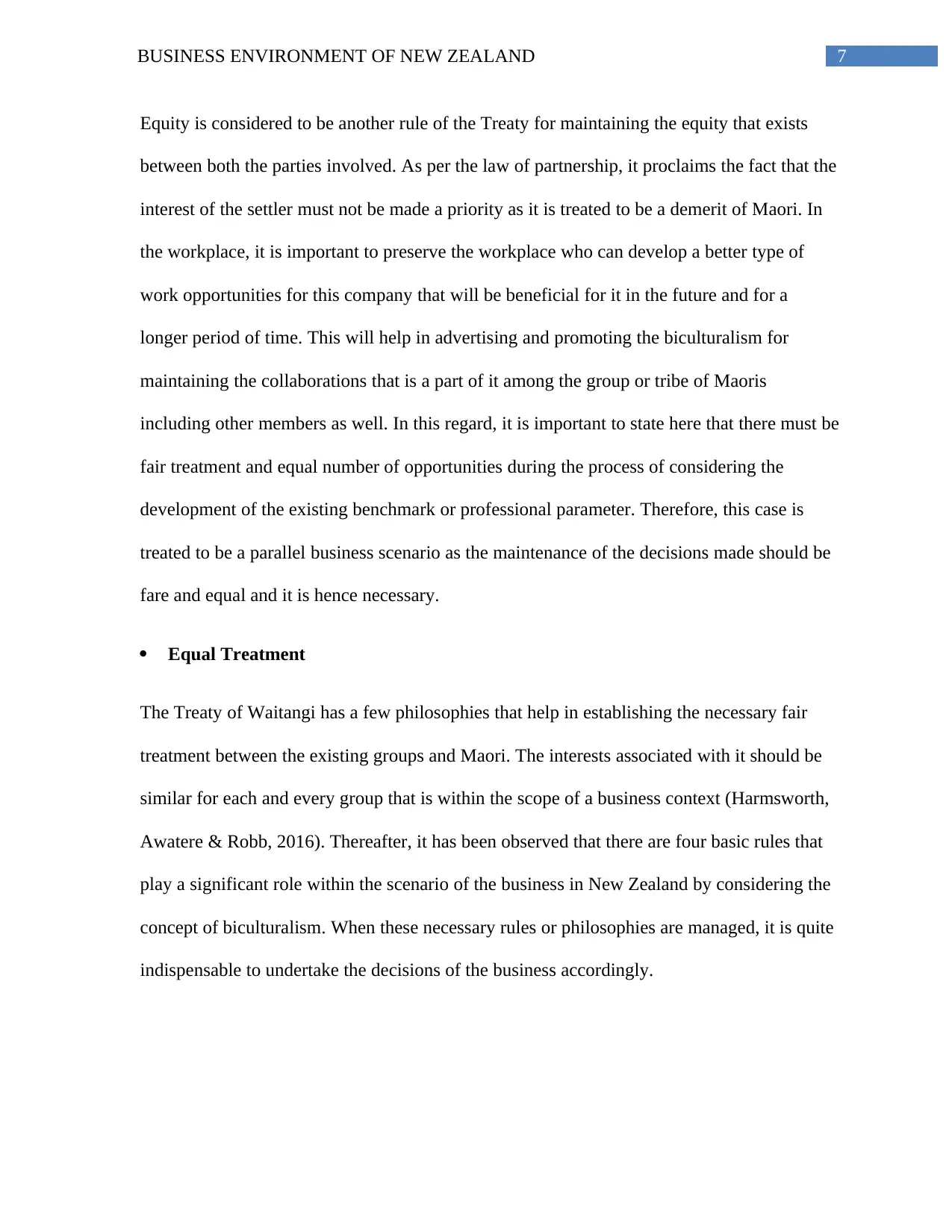
7BUSINESS ENVIRONMENT OF NEW ZEALAND
Equity is considered to be another rule of the Treaty for maintaining the equity that exists
between both the parties involved. As per the law of partnership, it proclaims the fact that the
interest of the settler must not be made a priority as it is treated to be a demerit of Maori. In
the workplace, it is important to preserve the workplace who can develop a better type of
work opportunities for this company that will be beneficial for it in the future and for a
longer period of time. This will help in advertising and promoting the biculturalism for
maintaining the collaborations that is a part of it among the group or tribe of Maoris
including other members as well. In this regard, it is important to state here that there must be
fair treatment and equal number of opportunities during the process of considering the
development of the existing benchmark or professional parameter. Therefore, this case is
treated to be a parallel business scenario as the maintenance of the decisions made should be
fare and equal and it is hence necessary.
Equal Treatment
The Treaty of Waitangi has a few philosophies that help in establishing the necessary fair
treatment between the existing groups and Maori. The interests associated with it should be
similar for each and every group that is within the scope of a business context (Harmsworth,
Awatere & Robb, 2016). Thereafter, it has been observed that there are four basic rules that
play a significant role within the scenario of the business in New Zealand by considering the
concept of biculturalism. When these necessary rules or philosophies are managed, it is quite
indispensable to undertake the decisions of the business accordingly.
Equity is considered to be another rule of the Treaty for maintaining the equity that exists
between both the parties involved. As per the law of partnership, it proclaims the fact that the
interest of the settler must not be made a priority as it is treated to be a demerit of Maori. In
the workplace, it is important to preserve the workplace who can develop a better type of
work opportunities for this company that will be beneficial for it in the future and for a
longer period of time. This will help in advertising and promoting the biculturalism for
maintaining the collaborations that is a part of it among the group or tribe of Maoris
including other members as well. In this regard, it is important to state here that there must be
fair treatment and equal number of opportunities during the process of considering the
development of the existing benchmark or professional parameter. Therefore, this case is
treated to be a parallel business scenario as the maintenance of the decisions made should be
fare and equal and it is hence necessary.
Equal Treatment
The Treaty of Waitangi has a few philosophies that help in establishing the necessary fair
treatment between the existing groups and Maori. The interests associated with it should be
similar for each and every group that is within the scope of a business context (Harmsworth,
Awatere & Robb, 2016). Thereafter, it has been observed that there are four basic rules that
play a significant role within the scenario of the business in New Zealand by considering the
concept of biculturalism. When these necessary rules or philosophies are managed, it is quite
indispensable to undertake the decisions of the business accordingly.
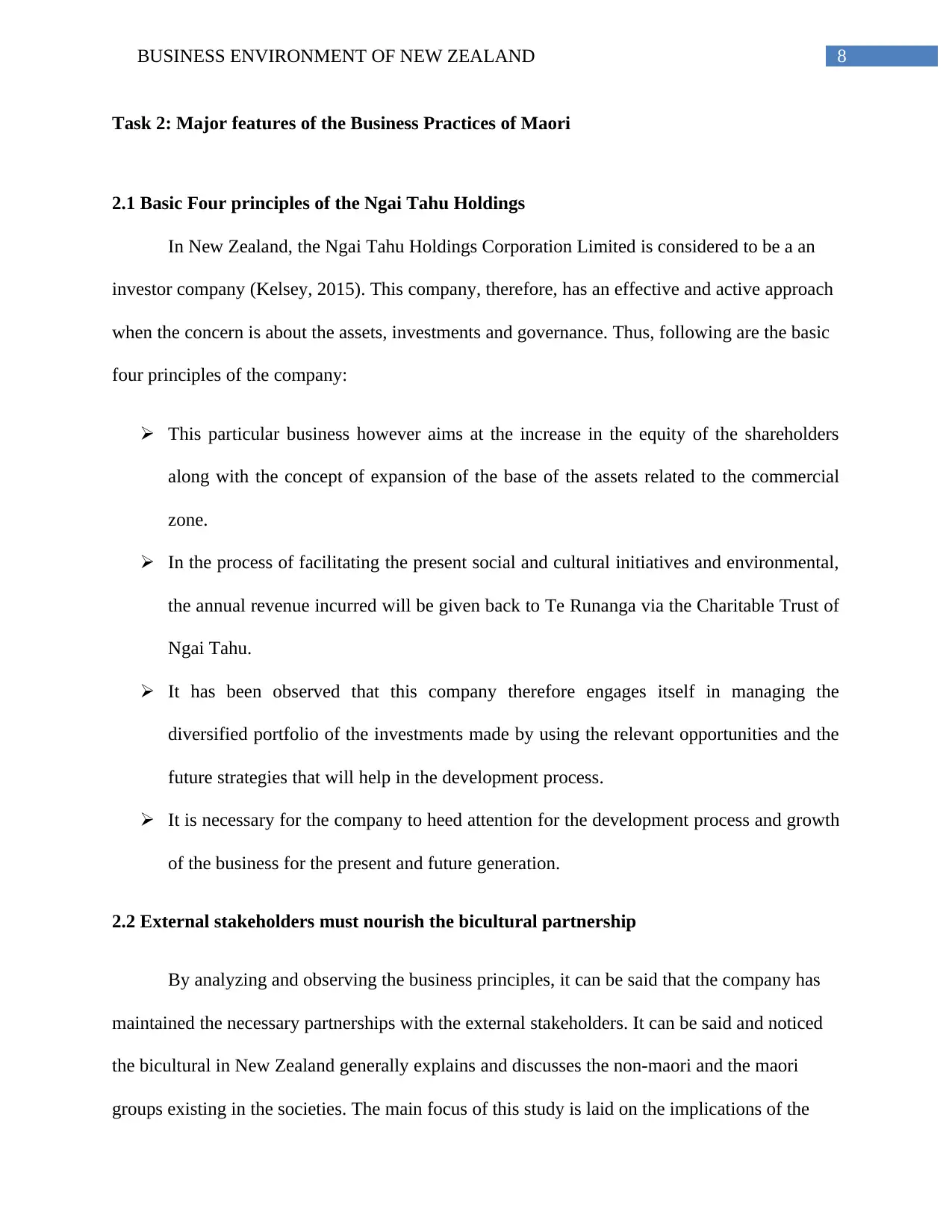
8BUSINESS ENVIRONMENT OF NEW ZEALAND
Task 2: Major features of the Business Practices of Maori
2.1 Basic Four principles of the Ngai Tahu Holdings
In New Zealand, the Ngai Tahu Holdings Corporation Limited is considered to be a an
investor company (Kelsey, 2015). This company, therefore, has an effective and active approach
when the concern is about the assets, investments and governance. Thus, following are the basic
four principles of the company:
This particular business however aims at the increase in the equity of the shareholders
along with the concept of expansion of the base of the assets related to the commercial
zone.
In the process of facilitating the present social and cultural initiatives and environmental,
the annual revenue incurred will be given back to Te Runanga via the Charitable Trust of
Ngai Tahu.
It has been observed that this company therefore engages itself in managing the
diversified portfolio of the investments made by using the relevant opportunities and the
future strategies that will help in the development process.
It is necessary for the company to heed attention for the development process and growth
of the business for the present and future generation.
2.2 External stakeholders must nourish the bicultural partnership
By analyzing and observing the business principles, it can be said that the company has
maintained the necessary partnerships with the external stakeholders. It can be said and noticed
the bicultural in New Zealand generally explains and discusses the non-maori and the maori
groups existing in the societies. The main focus of this study is laid on the implications of the
Task 2: Major features of the Business Practices of Maori
2.1 Basic Four principles of the Ngai Tahu Holdings
In New Zealand, the Ngai Tahu Holdings Corporation Limited is considered to be a an
investor company (Kelsey, 2015). This company, therefore, has an effective and active approach
when the concern is about the assets, investments and governance. Thus, following are the basic
four principles of the company:
This particular business however aims at the increase in the equity of the shareholders
along with the concept of expansion of the base of the assets related to the commercial
zone.
In the process of facilitating the present social and cultural initiatives and environmental,
the annual revenue incurred will be given back to Te Runanga via the Charitable Trust of
Ngai Tahu.
It has been observed that this company therefore engages itself in managing the
diversified portfolio of the investments made by using the relevant opportunities and the
future strategies that will help in the development process.
It is necessary for the company to heed attention for the development process and growth
of the business for the present and future generation.
2.2 External stakeholders must nourish the bicultural partnership
By analyzing and observing the business principles, it can be said that the company has
maintained the necessary partnerships with the external stakeholders. It can be said and noticed
the bicultural in New Zealand generally explains and discusses the non-maori and the maori
groups existing in the societies. The main focus of this study is laid on the implications of the
⊘ This is a preview!⊘
Do you want full access?
Subscribe today to unlock all pages.

Trusted by 1+ million students worldwide
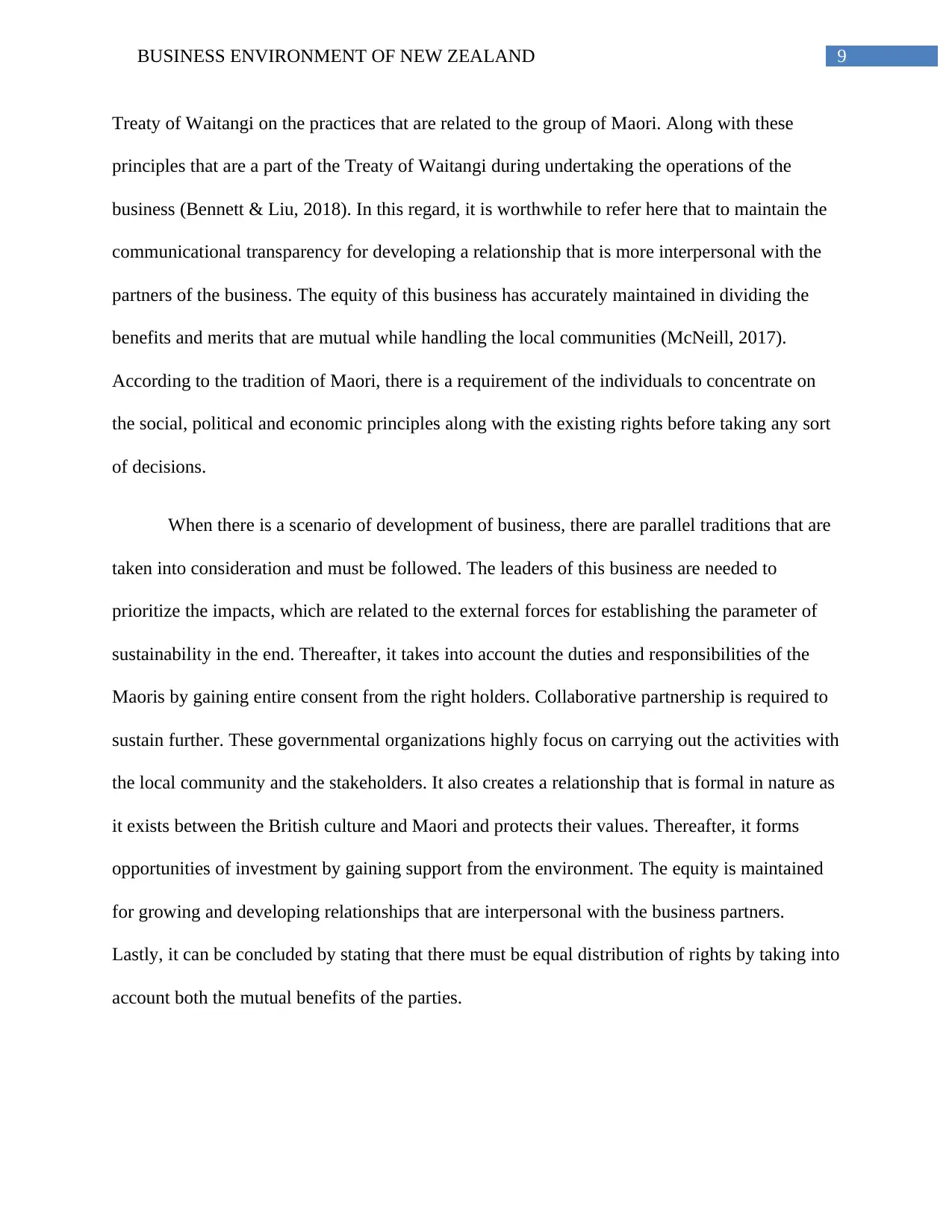
9BUSINESS ENVIRONMENT OF NEW ZEALAND
Treaty of Waitangi on the practices that are related to the group of Maori. Along with these
principles that are a part of the Treaty of Waitangi during undertaking the operations of the
business (Bennett & Liu, 2018). In this regard, it is worthwhile to refer here that to maintain the
communicational transparency for developing a relationship that is more interpersonal with the
partners of the business. The equity of this business has accurately maintained in dividing the
benefits and merits that are mutual while handling the local communities (McNeill, 2017).
According to the tradition of Maori, there is a requirement of the individuals to concentrate on
the social, political and economic principles along with the existing rights before taking any sort
of decisions.
When there is a scenario of development of business, there are parallel traditions that are
taken into consideration and must be followed. The leaders of this business are needed to
prioritize the impacts, which are related to the external forces for establishing the parameter of
sustainability in the end. Thereafter, it takes into account the duties and responsibilities of the
Maoris by gaining entire consent from the right holders. Collaborative partnership is required to
sustain further. These governmental organizations highly focus on carrying out the activities with
the local community and the stakeholders. It also creates a relationship that is formal in nature as
it exists between the British culture and Maori and protects their values. Thereafter, it forms
opportunities of investment by gaining support from the environment. The equity is maintained
for growing and developing relationships that are interpersonal with the business partners.
Lastly, it can be concluded by stating that there must be equal distribution of rights by taking into
account both the mutual benefits of the parties.
Treaty of Waitangi on the practices that are related to the group of Maori. Along with these
principles that are a part of the Treaty of Waitangi during undertaking the operations of the
business (Bennett & Liu, 2018). In this regard, it is worthwhile to refer here that to maintain the
communicational transparency for developing a relationship that is more interpersonal with the
partners of the business. The equity of this business has accurately maintained in dividing the
benefits and merits that are mutual while handling the local communities (McNeill, 2017).
According to the tradition of Maori, there is a requirement of the individuals to concentrate on
the social, political and economic principles along with the existing rights before taking any sort
of decisions.
When there is a scenario of development of business, there are parallel traditions that are
taken into consideration and must be followed. The leaders of this business are needed to
prioritize the impacts, which are related to the external forces for establishing the parameter of
sustainability in the end. Thereafter, it takes into account the duties and responsibilities of the
Maoris by gaining entire consent from the right holders. Collaborative partnership is required to
sustain further. These governmental organizations highly focus on carrying out the activities with
the local community and the stakeholders. It also creates a relationship that is formal in nature as
it exists between the British culture and Maori and protects their values. Thereafter, it forms
opportunities of investment by gaining support from the environment. The equity is maintained
for growing and developing relationships that are interpersonal with the business partners.
Lastly, it can be concluded by stating that there must be equal distribution of rights by taking into
account both the mutual benefits of the parties.
Paraphrase This Document
Need a fresh take? Get an instant paraphrase of this document with our AI Paraphraser
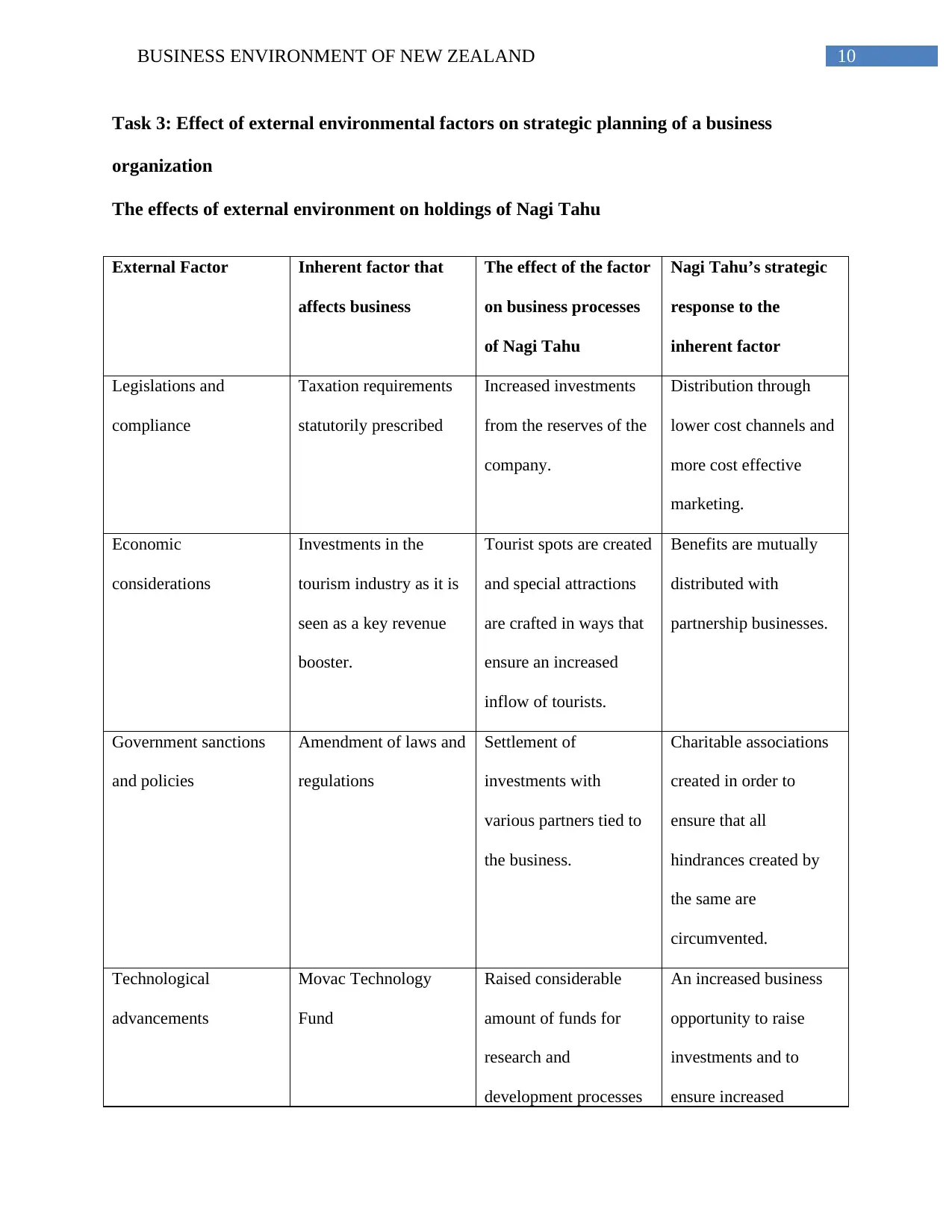
10BUSINESS ENVIRONMENT OF NEW ZEALAND
Task 3: Effect of external environmental factors on strategic planning of a business
organization
The effects of external environment on holdings of Nagi Tahu
External Factor Inherent factor that
affects business
The effect of the factor
on business processes
of Nagi Tahu
Nagi Tahu’s strategic
response to the
inherent factor
Legislations and
compliance
Taxation requirements
statutorily prescribed
Increased investments
from the reserves of the
company.
Distribution through
lower cost channels and
more cost effective
marketing.
Economic
considerations
Investments in the
tourism industry as it is
seen as a key revenue
booster.
Tourist spots are created
and special attractions
are crafted in ways that
ensure an increased
inflow of tourists.
Benefits are mutually
distributed with
partnership businesses.
Government sanctions
and policies
Amendment of laws and
regulations
Settlement of
investments with
various partners tied to
the business.
Charitable associations
created in order to
ensure that all
hindrances created by
the same are
circumvented.
Technological
advancements
Movac Technology
Fund
Raised considerable
amount of funds for
research and
development processes
An increased business
opportunity to raise
investments and to
ensure increased
Task 3: Effect of external environmental factors on strategic planning of a business
organization
The effects of external environment on holdings of Nagi Tahu
External Factor Inherent factor that
affects business
The effect of the factor
on business processes
of Nagi Tahu
Nagi Tahu’s strategic
response to the
inherent factor
Legislations and
compliance
Taxation requirements
statutorily prescribed
Increased investments
from the reserves of the
company.
Distribution through
lower cost channels and
more cost effective
marketing.
Economic
considerations
Investments in the
tourism industry as it is
seen as a key revenue
booster.
Tourist spots are created
and special attractions
are crafted in ways that
ensure an increased
inflow of tourists.
Benefits are mutually
distributed with
partnership businesses.
Government sanctions
and policies
Amendment of laws and
regulations
Settlement of
investments with
various partners tied to
the business.
Charitable associations
created in order to
ensure that all
hindrances created by
the same are
circumvented.
Technological
advancements
Movac Technology
Fund
Raised considerable
amount of funds for
research and
development processes
An increased business
opportunity to raise
investments and to
ensure increased
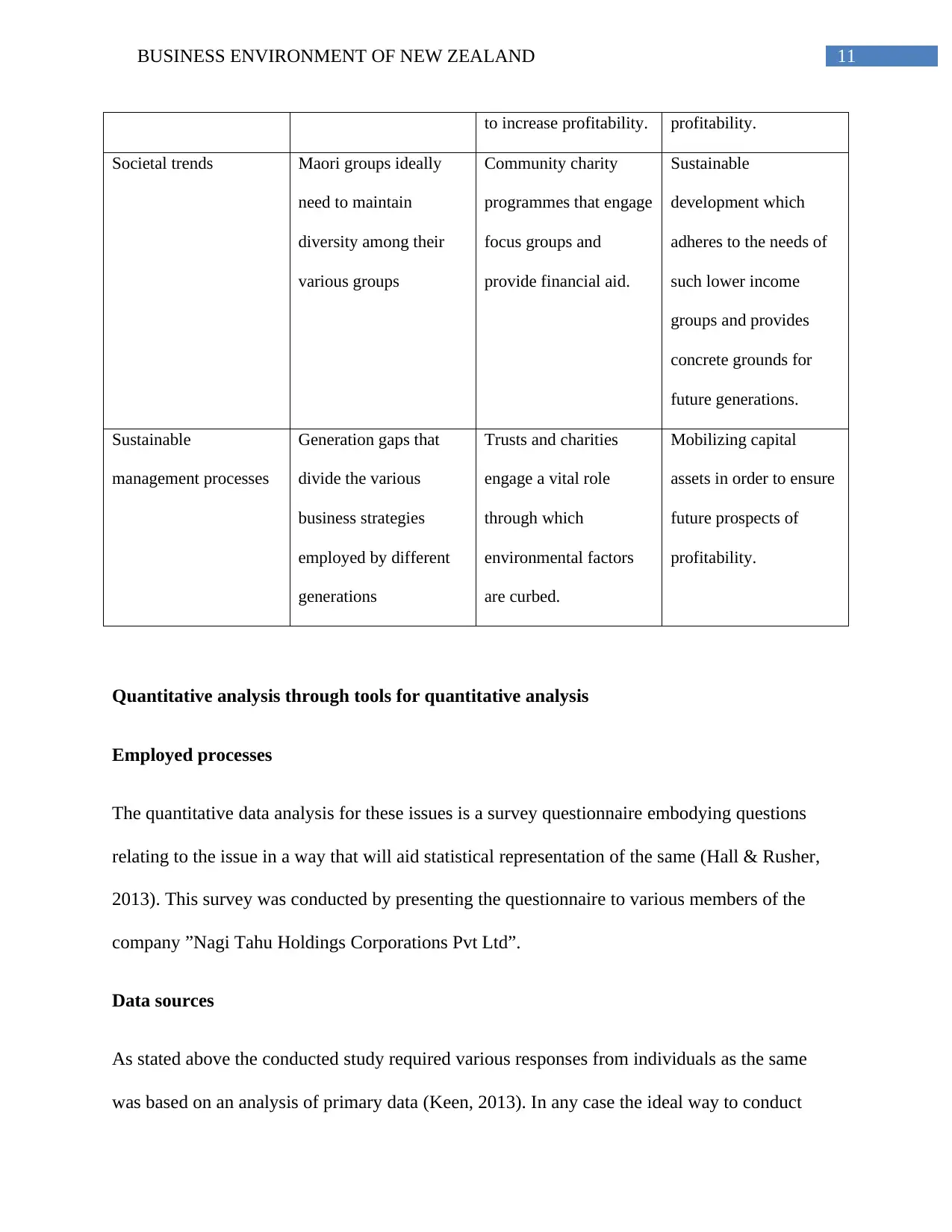
11BUSINESS ENVIRONMENT OF NEW ZEALAND
to increase profitability. profitability.
Societal trends Maori groups ideally
need to maintain
diversity among their
various groups
Community charity
programmes that engage
focus groups and
provide financial aid.
Sustainable
development which
adheres to the needs of
such lower income
groups and provides
concrete grounds for
future generations.
Sustainable
management processes
Generation gaps that
divide the various
business strategies
employed by different
generations
Trusts and charities
engage a vital role
through which
environmental factors
are curbed.
Mobilizing capital
assets in order to ensure
future prospects of
profitability.
Quantitative analysis through tools for quantitative analysis
Employed processes
The quantitative data analysis for these issues is a survey questionnaire embodying questions
relating to the issue in a way that will aid statistical representation of the same (Hall & Rusher,
2013). This survey was conducted by presenting the questionnaire to various members of the
company ”Nagi Tahu Holdings Corporations Pvt Ltd”.
Data sources
As stated above the conducted study required various responses from individuals as the same
was based on an analysis of primary data (Keen, 2013). In any case the ideal way to conduct
to increase profitability. profitability.
Societal trends Maori groups ideally
need to maintain
diversity among their
various groups
Community charity
programmes that engage
focus groups and
provide financial aid.
Sustainable
development which
adheres to the needs of
such lower income
groups and provides
concrete grounds for
future generations.
Sustainable
management processes
Generation gaps that
divide the various
business strategies
employed by different
generations
Trusts and charities
engage a vital role
through which
environmental factors
are curbed.
Mobilizing capital
assets in order to ensure
future prospects of
profitability.
Quantitative analysis through tools for quantitative analysis
Employed processes
The quantitative data analysis for these issues is a survey questionnaire embodying questions
relating to the issue in a way that will aid statistical representation of the same (Hall & Rusher,
2013). This survey was conducted by presenting the questionnaire to various members of the
company ”Nagi Tahu Holdings Corporations Pvt Ltd”.
Data sources
As stated above the conducted study required various responses from individuals as the same
was based on an analysis of primary data (Keen, 2013). In any case the ideal way to conduct
⊘ This is a preview!⊘
Do you want full access?
Subscribe today to unlock all pages.

Trusted by 1+ million students worldwide
1 out of 18
Related Documents
Your All-in-One AI-Powered Toolkit for Academic Success.
+13062052269
info@desklib.com
Available 24*7 on WhatsApp / Email
![[object Object]](/_next/static/media/star-bottom.7253800d.svg)
Unlock your academic potential
Copyright © 2020–2026 A2Z Services. All Rights Reserved. Developed and managed by ZUCOL.




